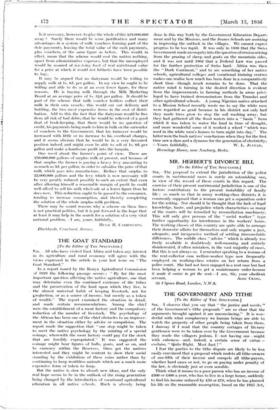MR. HERBERT'S DIVORCE BILL
[To the Editor of THE SPECTATOR.] SIR,--The proposal to extend the jurisdiction of the police courts in matrimonial eases is surely an astonishing one, in view of the record of these courts in this regard. The exercise of their present matrimonial jurisdiction is one of the factors contributory to the present instability of family life ; so much so that in many working-class districts it is commonly supposed that a woman can get a separation order for the asking. Nor should it be thought that the lack of legal knowledge, haste, and prejudice which characterises so many of the courts will be remedied by reconciliation machinery. This will only give persons of the " social worker " type further opportunity for interference in the workers' home. The working classes of this country arc quite able to arrange their domestic affairs for themselves and only require a just, adequate, and inexpensive method of settling irreconcilable differences. The middle class " advice " which is already too freely available is doubtlessly well-meaning and entirely disinterested, if often mistaken, in the vast majority of cases. But this is not always so. I remember speaking to a woman of the rent-collector cum welfare-worker type now frequently employed on working-class estates on her return from a police court. She had not been engaged in a rent case but had been helping a woman to get a maintenance order because it made it easier to get the rent.—.1 ani, Sir, your obedient














































 Previous page
Previous page